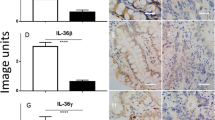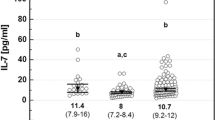Abstract
Purpose
Interleukin-10 (IL-10) is a unique cytokine that is thought to be a potent immunostimulatory and immunosuppressive factor. The aim of this study was to investigate IL-10 expression in colorectal cancer, and clarify its relationship to the clinicopathological findings and prognosis.
Methods
Tissue samples were collected from 92 patients with colorectal cancer and adjacent normal mucosa. The expression of IL-10 in colorectal cancer tissues was evaluated by immunohistochemistry. Tissue levels of IL-10 were measured by enzyme-linked immunosorbent assay.
Results
The mean concentration of IL-10 did not significantly differ between the cancer tissue and adjacent normal mucosa. The IL-10 concentration in cancer tissue with positive staining immunohistochemically was significantly higher than that without IL-10 staining. The IL-10 level in cancer tissue decreased in accordance with advanced-stage serosal invasion and lymph node involvement, and thus predicted poor survival in patients undergoing surgery with curative intent. A Cox multivariate analysis demonstrated that a decreased IL-10 level in cancer tissue was an independent risk factor for poor survival.
Conclusion
The tumor IL-10 level in colorectal cancer was inversely correlated with serosal invasion and lymph node metastasis, which thus reflected tumor progression. Evaluating the tumor expression of IL-10 may therefore provide valuable information for predicting the long-term survival in patients undergoing surgery with curative intent.
Similar content being viewed by others
References
Pawelec G, Barnett Y, Forsey R, Frasca D, Globerson A, McLeod J, et al. T cells and aging, January 2002 update. Front Biosci 2002;7:1056–1183.
Grunfeld C. Leptin and the immunosuppression of malnutrition. J Clin Endocrinol Metab 2002;87:3038–3039.
Miki C, Tanaka K, Inoue Y, Araki T, Ohi M, Mohri Y, et al. Perioperative host-tumor inflammatory interactions: a potential trigger for disease recurrence following a curative resection for colorectal cancer. Surg Today 2008;38:579–584.
Heriot AG, Marriott JB, Cookson S, Kumar D, Dalgleish AG. Reduction in cytokine production in colorectal cancer patients: association with stage and reversal by resection. Br J Cancer 2000;82:1009–1012.
Galizia G, Lieto E, De Vita F, Romano C, Orditura M, Castellano P, et al. Circulating levels of interleukin-10 and interleukin-6 in gastric and colon cancer patients before and after surgery: relationship with radicality and outcome. J Interferon Cytokine Res 2002;22:473–482.
Zou W. Immunosuppressive networks in the tumour environment and their therapeutic relevance. Nat Rev Cancer 2005;5:263–274.
de Waal Malefyt R, Haanen J, Spits H, Roncarolo MG, te Velde A, Figdor C, et al. Interleukin-10 (IL-10) and viral IL-10 strongly reduce antigen-specific human T-cell proliferation by diminishing the antigen-presenting capacity of monocytes via downregulation of class II major histocompatibility complex expression. J Exp Med 1991;174:915–924.
Taga K, Mostowski H, Tosato G. Human interleukin-10 can directly inhibit T cell growth. Blood 1993;81:2964–2971.
Ralph P, Nakoinz I, Sampson-Johannes A, Fong S, Lowe D, Min HY, et al. IL-10, T-lymphocyte inhibitor of human blood cell production of IL-1 and tumor necrosis factor. J Immunol 1992;148:808–814.
Avradopoulos K, Mehta S, Blackinton D, Wanebo HJ. Interleukin-10 as a possible mediator of immunosuppressive effect in patients with squamous cell carcinoma of the head and neck. Ann Surg Oncol 1997;4:184–190.
Sredni B, Weil M, Khomenok G, Lebenthal I, Teitz S, Mardor Y, et al. Ammonium trichloro(dioxoethylene-o,o′)tellurate (AS101) sensitizes tumors to chemotherapy by inhibiting the tumor interleukin 10 autocrine loop. Cancer Res 2004;64:1843–1852.
Alas S, Emmanouilides C, Bonavida B. Inhibition of interleukin 10 by rituximab results in down-regulation of bcl-2 and sensitization of B-cell non-Hodgkin’s lymphoma to apoptosis. Clin Cancer Res 2001;7:709–723.
Nemunaitis J, Fong T, Shabe P, Martineau D, Ando D. Comparison of serum interleukin-10 (IL-10) levels between normal volunteers and patients with advanced melanoma. Cancer Invest 2001;19:239–247.
Kim J, Modlin RL, Moy RL, Dubinett SM, McHugh T, Nickoloff BJ, et al. IL-10 production in cutaneous basal and squamous cell carcinomas. A mechanism for evading the local T cell immune response. J Immunol 1995;155:2240–2247.
Wittke F, Hoffmann R, Buer J, Dallmann I, Oevermann K, Sel S, et al. Interleukin 10 (IL-10): an immunosuppressive factor and independent predictor in patients with metastatic renal cell carcinoma. Br J Cancer 1999;79:1182–1184.
Gastl GA, Abrams JS, Nanus DM, Oosterkamp R, Silver J, Liu F, et al. Interleukin-10 production by human carcinoma cell lines and its relationship to interleukin-6 expression. Int J Cancer 1993;55:96–101.
Herbeuval JP, Lelievre E, Lambert C, Dy M, Genin C. Recruitment of STAT3 for production of IL-10 by colon carcinoma cells induced by macrophage derived IL-6. J Immunol 2004;172:4630–4636.
Bohlen H, Kessler M, Sextro M, Diehl V, Tesch H. Poor clinical outcome of patients with Hodgkin’s disease and elevated interleukin-10 serum levels. Clinical significance of interleukin-10 serum levels for Hodgkin’s disease. Ann Hematol 2000;79:110–113.
Lech-Maranda E, Baseggio L, Bienvenu J, Charlot C, Berger F, Rigal D, et al. Interleukin-10 gene promoter polymorphisms influence the clinical outcome of diffuse large B-cell lymphoma. Blood 2004;103:3529–3534.
Chau GY, Wu CW, Lui WY, Chang TJ, Kao HL, Wu LH, et al. Serum interleukin-10 but not interleukin-6 is related to clinical outcome in patients with resectable hepatocellular carcinoma. Ann Surg 2000;231:552–558.
Asadullah K, Sterry W, Volk HD. Interleukin-10 therapy — review of a new approach. Pharmacol Rev 2003;55:241–269.
Ebrahimi B, Tucker SL, Li D, Abbruzzese JL, Kurzrock R. Cytokines in pancreatic carcinoma: correlation with phenotypic characteristics and prognosis. Cancer 2004;101:2727–2736.
Negrier S, Perol D, Menetrier-Caux C, Escudier B, Pallardy M, Ravaud A, et al. Interleukin-6, interleukin-10, and vascular endothelial growth factor in metastatic renal cell carcinoma: prognostic value of interleukin-6 — from the Groupe Francais d’Immunotherapie. J Clin Oncol 2004;22:2371–2378.
Lu C, Soria JC, Tang X, Xu XC, Wang L, Mao L, et al. Prognostic factors in resected stage I non-small-cell lung cancer: a multivariate analysis of six molecular markers. J Clin Oncol 2004;22:4575–4583.
Dummer W, Becker JC, Schwaaf A, Leverkus M, Moll T, Brocker EB. Elevated serum levels of Interleukin-10 in patients with metastatic malignant melanoma. Melanoma Res 1995;5:67–68.
Gotlieb WH, Abrams JS, Watson JM, Velu TJ, Berek JS, Martinez-Maza O. Presence of Interleukin-10 (IL-10) in the ascites of patients with ovarian and other intra-abdominal cancers. Cytokine 1992;4:385–390.
Khatri VP, Caligiuri MA. A review of the association between Interleukin-10 and human B-cell malignancies. Cancer Immunol Immunother 1998;46:239–244.
Klein B, Lu ZY, Gu ZJ, Costes V, Jourdan M, Rossi JF. Interleukin-10 and Gp130 cytokines in human multiple myeloma. Leuk Lymphoma 1999;34:63–70.
De Vita F, Orditura M, Galizia G, Romano C, Roscigno A, Lieto E, et al. Serum interleukin-10 levels as a prognostic factor in advanced non-small cell lung cancer patients. Chest 2000;117:365–373.
De Vita F, Orditura M, Galizia G, Romano C, Infusino S, Auriemma A, et al. Serum interleukin-10 levels in patients with advanced gastrointestinal malignancies. Cancer 1999;86:1936–1943.
Galizia G, Orditura M, Romano C, Lieto E, Castellano P, Pelosio L, et al. Prognostic significance of circulating IL-10 and IL-6 serum levels in colon cancer patients undergoing surgery. Clin Immunol 2002;102:169–178.
Giacomelli L, Gianni W, Belfiore C, Gandini O, Repetto L, Filippini A, et al. Persistence of epidermal growth factor receptor and interleukin 10 in blood of colorectal cancer patients after surgery identifies patients with high risk to relapse. Clin Cancer Res 2003;9:2678–2682.
Yue FY, Dummer R, Geertsen R, Hofbauer G, Laine E, Manolio S, et al. Interleukin-10 is a growth factor for human melanoma cells and down-regulates HLA class-I, HLA class-II and ICAM-1 molecules. Int J Cancer 1997;71:630–637.
Cortes JE, Talpaz M, Cabanillas F, Seymour JF, Kurzrock R. Serum levels of Interleukin-10 in patients with diffuse large cell lymphoma: Lack of correlation with prognosis. Blood 1995;85:2516–2520.
Sjoberg J, Aguilar-Santelises M, Sjogren AM, Pisa EK, Ljungdahl A, Bjorkholm M, et al. Interleukin-10 mRNA expression in B-cell chronic lymphocytic leukaemia inversely correlates with progression of disease. Br J Haematol 1996;92:393–400.
Adris S, Klein S, Jasnis M, Chuluyan E, Ledda M, Bravo A, et al. IL-10 expression by CT26 colon carcinoma cells inhibits their malignant phenotype and induces a T cell-mediated tumor rejection in the context of a systemic Th2 response. Gene Ther 1999;6:1705–1712.
Giovarelli M, Musiani P, Modesti A, Dellabona P, Casorati G, Allione A, et al. Local release of IL-10 by transfected mouse mammary adenocarcinoma cells does not suppress but enhances antitumor reaction and elicits a strong cytotoxic lymphocyte and antibody-dependent immune memory. J Immunol 1995;155:3112–3123.
Richter G, Kruger-Krasagakes S, Hein G, Huls C, Schmitt E, Diamantstein T, et al. Interleukin-10 transfected into Chinese hamster ovary cells prevents tumor growth and macrophage infiltration. Cancer Res 1993;53:4134–4137.
Gerard CM, Bruyns C, Delvaux A, Baudson N, Dargent JL, Goldman M, et al. Loss of tumorigenicity and increased immunogenicity induced by interleukin-10 gene transfer in B16 melanoma cells. Hum Gene Ther 1996;7:23–31.
Gastl GA, Abrams JS, Nanus DM, Oosterkamp R, Silver J, Liu F, et al. Interleukin-10 production by human carcinoma cell lines and its relationship to interleukin-6 expression. Int J Cancer 1993;55:96–101.
Herbeuval JP, Lelievre E, Lambert C, Dy M, Genin C. Recruitment of STAT3 for production of IL-10 by colon carcinoma cells induced by macrophage-derived IL-6. J Immunol 2004;172:4630–4636.
Zheng LM, Ojcius DM, Garaud F, Roth C, Maxwell E, Li Z, et al. Interleukin-10 inhibits tumor metastasis through an NK cell-dependent mechanism. J Exp Med 1996;184:579–584.
Berman RM, Suzuki T, Tahara H, Robbins PD, Narula SK, Lotze MT. Systemic administration of cellular IL-10 induces an effective, specific, and long-lived immune response against established tumors in mice. J Immunol 1996;157:231–238.
Jarry A, Bossard C, Bou-Hanna C, Masson D, Espaze E, Denis MG, et al. Mucosal IL-10 and TGF-beta play crucial roles in preventing LPS-driven, IFN-gamma-mediated epithelial damage in human colon explants. J Clin Invest 2008;118:1132–1142.
Huang S, Ullrich SE, Bar-Eli M. Regulation of tumor growth and metastasis by interleukin-10:the melanoma experience. J Interferon Cytokine Res 1999;19:697–703.
Stearns ME, Garcia FU, Fudge K, Rhim J, Wang M. Role of interleukin 10 and transforming growth factor beta1 in the angiogenesis and metastasis of human prostate primary tumor lines from orthotopic implants in severe combined immunodeficiency mice. Clin Cancer Res 1999;5:711–720.
Cervenak L, Morbidelli L, Donati D, Donnini S, Kambayashi T, Wilson JL, et al. Abolished angiogenicity and tumorigenicity of Burkitt lymphoma by interleukin-10. Blood 2000;96:2568–2573.
Kundu N, Dorsey R, Jackson MJ, Guiterrez P, Wilson K, Fu S, et al. Interleukin-10 gene transfer inhibits murine mammary tumors and elevates nitric oxide. Int J Cancer 1998;76:713–719.
Author information
Authors and Affiliations
Rights and permissions
About this article
Cite this article
Toiyama, Y., Miki, C., Inoue, Y. et al. Loss of tissue expression of interleukin-10 promotes the disease progression of colorectal carcinoma. Surg Today 40, 46–53 (2010). https://doi.org/10.1007/s00595-009-4016-7
Received:
Accepted:
Published:
Issue Date:
DOI: https://doi.org/10.1007/s00595-009-4016-7




